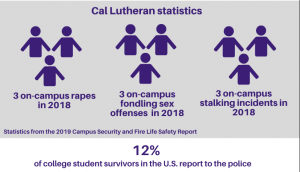Q & A with Cal Lutheran’s Title IX Coordinators
November 19, 2019
Cal Lutheran Title IX Coordinator Jim McHugh and Deputy Title IX Coordinator Chris Paul responded to these questions via email on Nov. 15. Answers are printed verbatim.
What are the different roles of Hearing Officer, Title IX Investigator, and Title IX Coordinator in Title IX cases? Specifically, who writes the investigation report, and who makes the final decision of responsibility?
“Title IX Investigator (there is no hearing officer) conducts the interviews and gathers the facts of the case. They meet with all parties involved and witnesses. They also write the investigation report.
The Title IX Coordinator is responsible for the oversight of all Title IX policies and procedures. In cases that require a hearing panel, once the panel determines there is a policy violation, the Title IX Coordinator decides sanctions. In cases where there isn’t a hearing panel required, the Title IX Coordinator determines if there was a policy violation and if so, then they determine sanctions as well.”
Does Cal Lutheran use a single investigator model for Title IX cases?
“We use both single investigator and hearing panel. In cases where there is a possible severe sanction such as expulsion or suspension, then a hearing panel is required.”
What are the rights of both reporting and responding parties to review the investigation report? How does this review take place?
“Both parties have the right to review the report prior to hearing panel or decision. This report is available in person only and each party has the opportunity to respond to the report.”
What are the rights of reporting and responding parties to see evidence related to decisions in cases, both after preliminary findings and final decisions?
“Any evidence gathered throughout the investigation is available for both parties to review.”
What are the differences between a no-contact order and a restraining order?
“Restraining orders are legal documents. A no contact order is an administrative document issued by the university.”
Would you ever have to get a roommate’s permission to obtain either?
“We do not understand this question; however, permission is not required for the university to issue a no contact order.”
What are the consequences of breaking a no-contact order?
“Breaking a no contact order is viewed as harassment and will be reviewed by Student Conduct.”
How are RA’s trained to deal with Title IX?
“RA’s are trained by the Title IX Coordinator and Deputy Title Coordinator at least twice per year.”
Who do they/should they report to when they get a report?
“Like all responsible employees, they report any potential Title IX violations directly to the Title IX Coordinator and/or the Deputy Title IX Coordinator.”
Would there ever be a situation where a Hearing Officer, Title IX Investigator, or Title IX Coordinator would recuse themselves from participating in a case due to potential for conflict of interest with another role held at Cal Lutheran?
“Yes, of course we ensure there is no conflict of interest by any individual who is involved with any aspect of the case.”
What cases are reportable under the Clery Act? Do responding parties have to be found responsible in CLU Title IX proceedings for Title IX-related crimes to be reported in the annual security report?
“Here are a list of crimes that are Clery Act reportable:
- Murder (including nonnegligent and negligent manslaughter)
- Sex offenses (forcible/nonforcible, domestic violence, dating violence, and stalking)
- Robbery.
- Aggravated assault.
- Burglary.
- Motor vehicle theft.
- Arson.
- Arrest.
The annual security report lists all reportable crimes that have been reported to the university, irrelevant of whether someone is found responsible or not.”



